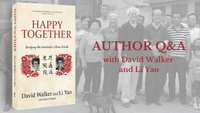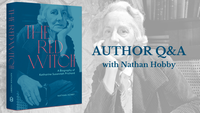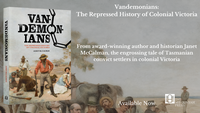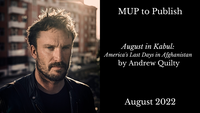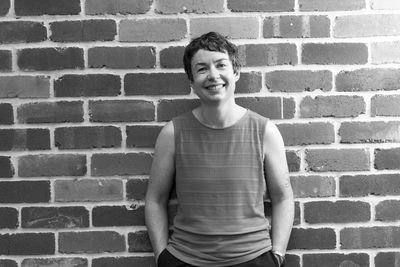EXTRACT: Julieanne Lamond Interviews Amanda Lohrey
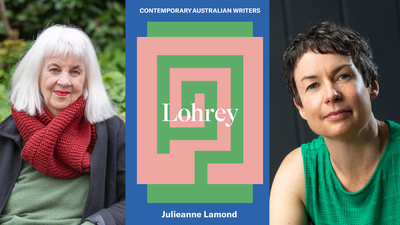
Tasmania’s Parliament House is a graceful Georgian sandstone building facing the Hobart waterfront. It is here, on the steps of the parliament, that Amanda Lohrey suggested we meet for the interview, so that I could see at firsthand the docks and backstreets of the waterfront that constituted the setting of her first novel, The Morality of Gentlemen. Lohrey has a frank, straightforward manner and a penetrating gaze. There is a steadiness about her, as though others can flap about all they like and she’ll wait until they have finished. She has a remarkable voice, deep and sonorous, which holds a calm authority but is very ready to register a wry humour.
The way you describe growing up here makes it sound like tremendous fun. Is that how you remember it?
When you are a child you take your milieu for granted. It’s all you know. I lived in a street that ran down to the waterfront and was home to several extended families, mostly wharfies and fishermen. There were no girls in my street. I played with a gang of boys, most of whom ended up in jail. There were some serious villains around here. Not that you felt unsafe at any time because it was a community. A lot of what my father thought were funny stories are, in retrospect, hair-raising. About, you know, bookies’ hitmen who would turn up occasionally looking for someone with gambling debts and the community would pretend the sought-after person had never existed: ‘Never heard of him’. You didn’t call the police no matter what kind of disturbance there was. They were the enemy… I also lived here as a student—you used to be able to rent on the Point cheaply.
It doesn’t look like student digs anymore! How did things change for you when you were moved out of this area?
Our very old street was classified as slum clearance and many historic properties were demolished. We moved out to a housing estate for war veterans and it was pretty dull. I continued on at the convent school I attended in the city.
I went to Catholic schools too and I’ve always wondered whether, even if you’re not religious, something about going to Catholic school shapes you in a particular way.
Of course it does. Have you read Mary McCarthy’s Memoirs of a Catholic Girlhood? McCarthy was taught in the US by an order of French nuns with an intellectual tradition. I got the opposite, the bog Irish superstition. It was primitive. But as McCarthy writes, the thing about a religious education is that once you are induced as a child to ask the big questions, you never stop asking them.
How aware were you of the political and ideological battles going on around you as a child?
You knew what was what. You went to school and you would go to Mass twice a week during school time, and I remember the Archbishop preaching about the red peril and the wharfies and I thought, he’s talking about my family. I’ve said this somewhere before, about children who have been exposed to conflicting narratives. When this happens, any half intelligent child is going to start asking which of the competing versions is true. And very often the outcome is: well, what’s my story, what am I going to make of this? Good training for a writer.
I wanted to ask you when you first got involved in politics yourself. You mentioned in one of the Quarterly Essays that you were a member of Young Labor at some point.
Yes, I joined at sixteen and I was vice-president of Labor Youth, as it was then known, not because no one would vote for me for president, but because I didn’t want to run for office and got dragooned into being vice-president. I remained in the Labor Party until around 1985, and I married a state Labor politician. When my husband left politics, I didn’t renew my membership because I knew I would write about politics and I thought it better not to have any card-carrying affiliation.
Have you ever thought of giving up writing?
Sometimes you have a tantrum and think, I’m wasting my time with fiction. And then something comes up and you think, that’d be interesting, and the next thing you’re making notes again and planning another novel … No, it’s like people who are gardeners; they don’t give up gardening unless they are physically incapacitated. I often compare writing to gardening. That way people know what I’m on about. The penny drops. Otherwise it’s a bit of a mystery. And often an over-romanticised mystery, whereas gardening is not over-romanticised. I sometimes describe writing as an incurable disease. You can’t stop even if you want to.
How do you know when a novel is done?
About three quarters of the way through the writing of a novel you start to think about the next one. At that point you realise that you haven’t far to go with the current opus.
I was going to ask you what you like to read.
I’ve just discovered the English writer Jane Gardam and her Old Filth trilogy. She has all the conventional bourgeois writerly virtues, and more. Meanwhile I’ve also just discovered Elizabeth Harrower and am now an admirer. Why is she not spoken of in the same respectful tones as White and Stead? She is technically such an interesting writer—she manages to write compellingly about sex without ever mentioning it—and so different, appearing at first to operate within the conventions of classic realism but constantly tilting her books off-balance. Good on Text Publishing for bringing her back into print.
I culled three hundred of my books in recent weeks and have found myself rereading some literary theory—Fred Jameson and Terry Eagleton, among others. Books I had forgotten I had and that still seem fresh, especially Jameson’s The Political Unconscious, an old favourite. It’s like suddenly finding an old portrait in the attic of who you once were and of course what you keep and what you discard is a fairly accurate portrait of who you are now.
A lot of my reading preferences are to do with my age. I get out writers I used to like—Colette, for example—and find I can’t read her now. I used to think Anita Brookner was tediously precious and now I marvel at her craft, and her intellect. It’s all age specific, and gender specific. I know this from male friends, their likes are very much conditioned by being men. It’s not true to say that good literature transcends gender. Occasionally I try a bestseller someone has recommended and more often than not I fail to finish it, or end up skim reading it to see how the plot works out. A good writer compels you to read every word.
